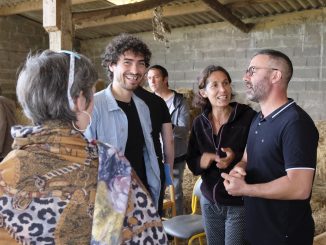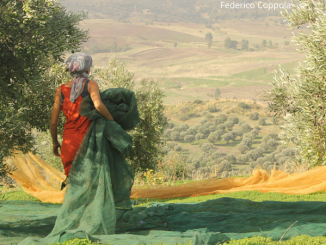
Updated 15/04/2020 at 13.11 CET ; 16.40 CET; 16/04/2020 at 11.53 CET; 21/04/2020 at 03.08
There is a spectrum of possible responses to this unfolding crisis, as we highlighted in the article by Simor Mair recently. Mair considers state capitalism, state socialism, mutual aid and barbarism as the four quadrants of response.
Here we’ll briefly introduce some small and also larger mutual aid initiatives, local, community and rural responses to covid19 – and what it brings out in people: from street to municipal levels, from rural to border areas.
Ecolise – the European Network for Community Led Initiatives on Climate Change and Sustainability – have been busy compiling an exceptional repertoire of community responses to Covid19. This includes cities’ responses, street by street solidarity, databases and lists of mutual aid initiatives in numerous locations.
Check out this lovely list of helping neighbours from the Dublin Inquirer, or this Mutual Aid compendium from the UK.
ESPON EGTC – a European Grouping on Territorial Cooperation, supported by the European Regional Development Fund, EU Member States and other states, are compiling examples of best practice at local, regional and territorial levels. Older people, digital access, neighbouring regions/border areas; rural/remote areas and SME support are some of their focus areas.
NEW The International Labour Organisation has a growing list of coops and social and solidarity economy initiatives that have responded to covid19 in noteworthy ways – including F.C. Barcelona (yes, its a coop!).
ENRD – The European Network for Rural Development – have compiled this list of rural responses to Covid19. As with ESPON, ENRD is also asking for examples to be sent to them, to build the database.
NEW – Shareable.net is a great resource for finding out about the best, most community-orientated elements of the sharing, collaborative and solidarity economies. This site has a range of useful articles on this matter, which will no doubt continue to rise. Here’s three – one from 26th March, 31st March and 20 lessons from The Response: How communities are changed by disasters.
Forum Synergies -a non-profit association of engaged citizens, organisations and active practitioners engaged in sustainable rural development – is compiling “messages from the countryside in times of crisis” to give the voice to those who want to share insights and outlooks:
“How can we connect? How can we foster a sense of solidarity and self-help between the rural residents and other rural stakeholders? Can we challenge rural distancing? How? If you have ideas, reflections or would like to share a personal experience on this situation in rural areas, write to us. Your experiences would help us understand the impact of this situation on rural areas.”
Some places are moving faster than others – Amsterdam is trying out the Amsterdam City Doughnut “which takes the global concept of the Doughnut and turns it into a tool for transformative action” according to Kate Raworth, who developed the Doughnut economics idea. (here’s the PDF explainer)
Collective Action
These is much to read, and we’ve a growing set of articles in our dedicated section on Covid19 . The most relevent to this mutual aid topic are below too.
Three other really interesting articles we would like to draw your attention to are the following: A New Superpower in the Making: Awareness-Based Collective Action by Otto Scharmer. This article shows just how fast self-help and mutual aid co-learning initiatives can string up. Similarly, George Monbiot brought together an array of inspiration in his fantastic article The horror films got it wrong. This virus has turned us into caring neighbours. Check out this veritable compendium of positive approaches from Marina Gernert – who speculates that ”a new normal is in the making”. NEW – and here’s a set of community food approaches in the UK that Megan Blake has found in our shared coronavirus context.
More on Community Responses to Covid19 from ARC2020
Coping with Covid19 – Commoning as a Pandemic Survival Strategy
Coping with Covid19 – the Open Food Network and the New Digital Order(s)
What will the World be like after Coronavirus? Four Possible Futures





